Trying to figure out how to choose a college major can feel overwhelming—especially when your future seems to hinge on the decision. Whether you’re a high school student planning ahead or already in college and feeling uncertain, this in-depth guide is here to help. Backed by research and real-world strategies, it walks you through every step of the decision-making process so you can choose a major that aligns with your passions, strengths, and career goals.
Table of Contents
Introduction: The Importance of Choosing the Right Major
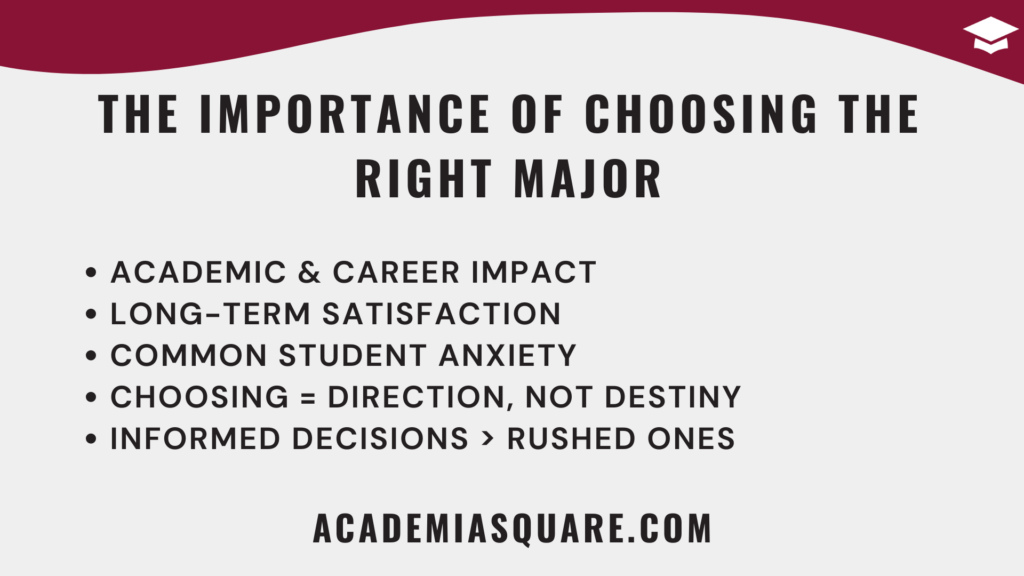
Choosing a college major is one of the most important academic decisions a student will make. It sets the foundation for future learning, professional opportunities, and long-term satisfaction. Yet, many students find themselves overwhelmed by the pressure to decide too early or without sufficient guidance. This chapter explores why this decision matters so much, especially for high school and college students preparing for their next steps.
Why Choosing a College Major Matters
A major isn’t just a collection of courses—it’s a structured path that shapes your college experience and often influences your career direction. While you’re not locked into one job forever, your college major can play a significant role in determining your starting point after graduation.
According to the U.S. Department of Education, over 30% of undergraduates change their major at least once. That’s not necessarily a bad thing, but it does highlight how uncertain the process can be. With careful planning and honest self-assessment, you can avoid unnecessary course corrections later.
Here’s why this choice deserves your full attention:
- Career alignment: Your major often corresponds with specific job sectors. For example, engineering majors tend to enter technical fields, while psychology majors may pursue counseling or social work.
- Time and money investment: Switching majors late can extend your graduation timeline, adding tuition costs and delaying your entry into the workforce.
- Academic motivation: Students who enjoy their major often report higher engagement and better grades, a factor linked to long-term academic and personal success.
The Link Between Your Major and Academic Performance
Students who choose a college major that aligns with their interests and strengths are more likely to perform better academically. According to research published in the Journal of College Student Development, interest-major congruence significantly predicts GPA and retention rates. Simply put: when you care about what you’re learning, you’re more likely to stick with it and excel.
This connection is especially important when considering strategies on how to get better grades. Students often underestimate how much easier it is to study and retain information when the subject matter resonates with them. Passion fuels persistence—and persistence improves performance.
Ask yourself these questions to gauge alignment between your potential major and academic performance:
- What subjects do I consistently enjoy and succeed in?
- When do I feel most focused or “in the zone” while studying?
- What types of assignments or projects have I been most proud of?
Long-Term Impact of Choosing a College Major
While some argue that your major doesn’t matter much in the “real world,” this is only partially true. Some majors offer more flexibility, while others prepare you for highly specialized careers. For example, a business degree might open doors across industries, while a degree in architecture leads to a much narrower professional path.
Moreover, employers often view your college major as a signal of your skills and interests. It can shape your résumé, networking opportunities, and even your graduate school options.
That said, remember that you’re not just choosing a major—you’re shaping a life direction. Choosing wisely means considering your current passions, long-term goals, and how your major will serve as a bridge between the two.
Checklist: Before You Choose
To lay the foundation for future chapters, here’s a brief checklist to get you thinking about your own decision-making process:
- Do I understand the career paths associated with each major I’m considering?
- Have I evaluated my academic strengths and weaknesses honestly?
- Have I spoken to professionals, professors, or career advisors?
- Do I know what excites me intellectually and professionally?
Understanding the stakes of choosing a college major is the first step in making a confident, informed decision. The next chapters will help you break down this complex choice into manageable, research-backed strategies.
Self-Assessment: Understanding Your Interests and Strengths
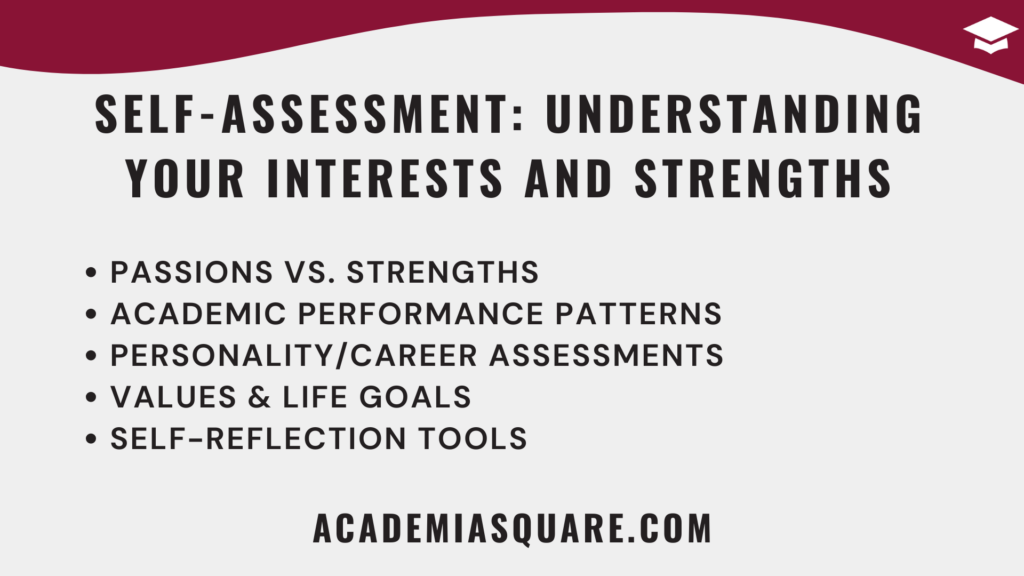
Before you can choose the right college major, you need to start with self-knowledge. This means identifying your academic strengths, personal interests, values, and long-term goals. It’s not just about what you’re good at—it’s about what energizes you and aligns with your future vision.
What Do You Enjoy Learning About?
Many students overlook this simple but crucial question. College requires hours of reading, writing, solving, and thinking. If you dread every minute of your classes, you’re unlikely to thrive. On the other hand, when you’re genuinely interested in the material, your engagement—and grades—improve.
Start by reflecting on your favorite high school or college classes. What topics made you lose track of time? What assignments excited you instead of stressed you out?
- Do you enjoy working with numbers, solving problems, or analyzing data?
- Do you find fulfillment in helping others or understanding human behavior?
- Are you drawn to creative expression—writing, designing, performing?
Identifying Your Academic Strengths
Enjoyment is key, but aptitude also matters. If you struggle constantly in a subject area, it may not be sustainable as a major. Review your academic records to identify consistent strengths. Ask teachers or professors for feedback. Use tools like the CliftonStrengths Assessment or Holland Code (RIASEC) to gain deeper insight.
Look for intersections between your passions and your performance. That sweet spot is often where your ideal major lies.
Understanding Personal Values and Life Goals
What matters to you beyond the classroom? Do you value stability, independence, creativity, or making a difference? These values can guide you toward majors that support the kind of lifestyle and impact you want.
For example:
- If financial stability is a top priority, consider majors with strong ROI like engineering or computer science.
- If you value social impact, explore education, public health, or social sciences.
- If you dream of independence, entrepreneurship or freelancing paths may suit you.
Being honest with yourself now will prevent disappointment later. This internal clarity will make external decisions much easier in the chapters ahead.
Exploring Career Goals and Market Demand

Once you understand your interests and strengths, it’s time to connect them to the real world. Choosing a college major isn’t just an academic decision—it’s also a professional one. A major can open or limit doors, depending on how well it aligns with market demand and career trends.
Matching Majors with Career Paths
Many students pick a major they like without thinking about where it leads. That can work, but a smarter move is to reverse-engineer the process. Start with careers that interest you, then investigate what majors typically lead there.
For instance:
- Want to become a lawyer? You can major in political science, history, English, or even philosophy.
- Dream of tech? Computer science, software engineering, or data science are solid paths.
- Interested in healthcare? Consider majors in biology, nursing, or public health.
Use tools like the Bureau of Labor Statistics’ Occupational Outlook Handbook to research job growth, salary expectations, and education requirements.
Understanding Market Trends and ROI
The job market is evolving. Some majors that were hot 10 years ago may not hold the same value today. Pay attention to economic trends, automation, and emerging fields. According to the National Association of Colleges and Employers (NACE), STEM majors consistently rank high in demand and starting salaries.
While passion is important, don’t ignore practical outcomes. For example, if you’re interested in media, explore newer tech-driven niches like digital marketing or UX design instead of traditional journalism.
How to Choose a College Major Based on Career Alignment
When evaluating majors, ask yourself:
- What are the top careers associated with this major?
- What is the median starting salary and growth potential?
- Are internships or co-op programs available in this field?
Making an informed choice now can save you years of career uncertainty later. Align your passion with practicality for the best long-term payoff.
How to Choose a College Major: A Step-by-Step Approach
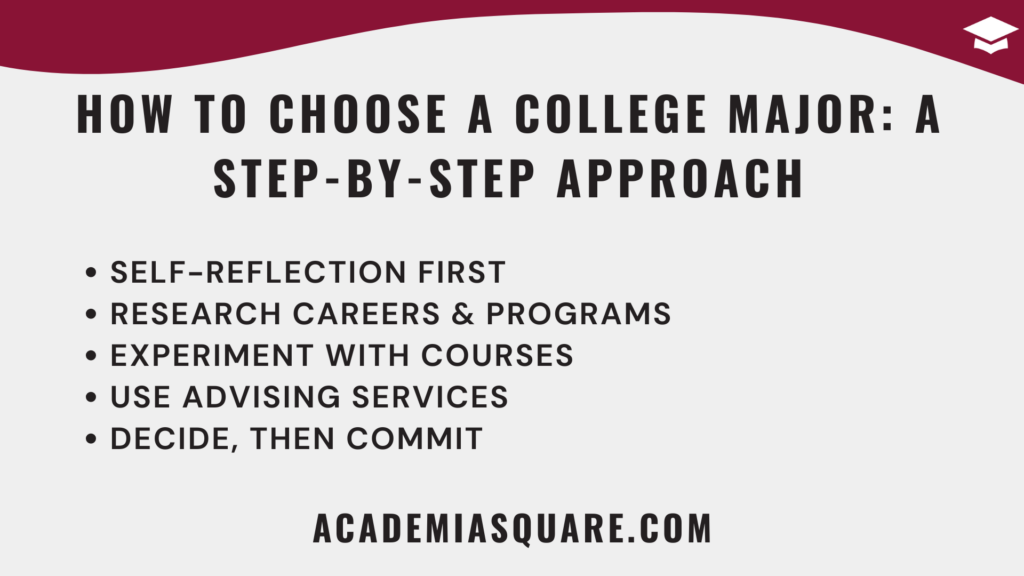
This is the heart of the process. If you’re wondering how to choose a college major without feeling overwhelmed, this structured, step-by-step method can help. By breaking it down, you’ll move from indecision to confidence.
Step 1: Self-Reflection
Think back to your interests, academic strengths, and values. Review your journal, checklist, or assessments. This foundation ensures that you make a decision rooted in authenticity, not pressure or trends.
Step 2: Career Research
Investigate the industries, roles, and lifestyles associated with potential majors. Look up job descriptions, required skills, and salary data. Conduct informational interviews with professionals or professors if possible.
Step 3: Explore College Programs
Not all schools offer the same strengths. Some may be known for business or engineering, others for arts or social sciences. Examine curriculum outlines, course options, faculty expertise, and internship opportunities.
- Does the major offer hands-on learning?
- Are there research, study abroad, or mentorship options?
- How flexible is the curriculum if you decide to pivot?
Step 4: Experiment Early
During your first year of college, try a range of electives tied to different majors. This low-stakes exploration can be eye-opening. Consider joining clubs, attending workshops, or talking to upperclassmen about their experiences.
Step 5: Use Academic and Career Advising
Your school offers resources—use them. Academic advisors can help map out degree requirements, while career counselors can align your goals with current job trends. Don’t navigate this alone.
Step 6: Make a Decision and Commit
After gathering all the info, it’s time to choose. Don’t aim for perfection—aim for progress. Your choice should be intentional and informed, not rushed or random. Remember, you can always adjust later, but making a thoughtful decision now sets a strong trajectory.
Following these steps makes the process of choosing a college major less intimidating and more strategic. You’ll feel more in control—and more likely to thrive academically and professionally.
The Role of General Education and Electives
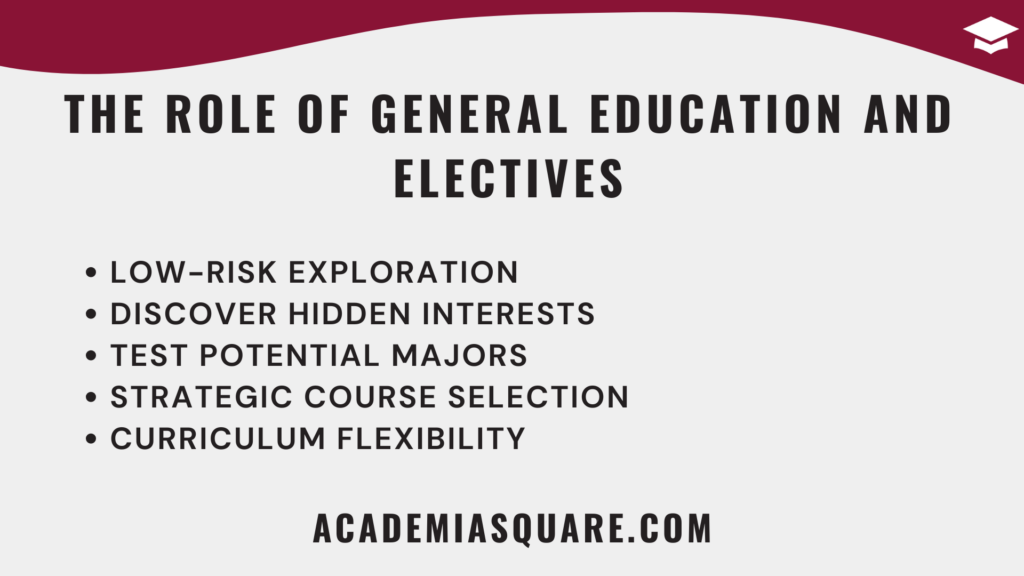
General education courses and electives are often seen as “filler,” but they can be powerful tools when trying to decide how to choose a college major. These early academic experiences expose you to a broad range of subjects, help you discover hidden interests, and build critical thinking skills that apply across all fields.
How Gen Ed Courses Support Major Exploration
Most colleges require students to take general education (Gen Ed) courses during their first one or two years. These classes span humanities, sciences, math, and social sciences. While they may not seem directly tied to your future job, they’re essential for developing a well-rounded academic foundation—and can help you evaluate your preferences in real time.
- A student might discover a love for anthropology after taking an intro course to meet a social science requirement.
- Another might confirm their disinterest in biology after struggling through a lab-based Gen Ed course.
These experiences are valuable feedback. If you’re still undecided about your major, Gen Ed classes provide low-risk opportunities for exploration while keeping you on track to graduate.
Using Electives to Test Potential Majors
Unlike Gen Eds, electives are courses you choose based on personal interest. They offer flexibility and depth that can clarify your major choice. Consider using electives to “try out” areas you’re considering as a major or minor.
For example:
- Curious about psychology? Take an introductory course before committing.
- Thinking of marketing? Sign up for a digital media or business writing elective.
- Unsure between biology and chemistry? Take a lab in each to see which you prefer.
This hands-on sampling often reveals whether your initial attraction to a subject holds up under the weight of real coursework.
Maximizing the Value of Your Early Coursework
If you’re serious about choosing the right major, approach Gen Eds and electives strategically:
- Select courses that align with majors you’re considering.
- Talk to professors—ask about research opportunities or career paths tied to the subject.
- Reflect after each semester. What courses came easily? What left you excited—or drained?
Remember: every course is data. If you pay attention, your general education experience can be one of the most powerful tools in your decision-making process.
Balancing Passion and Practicality
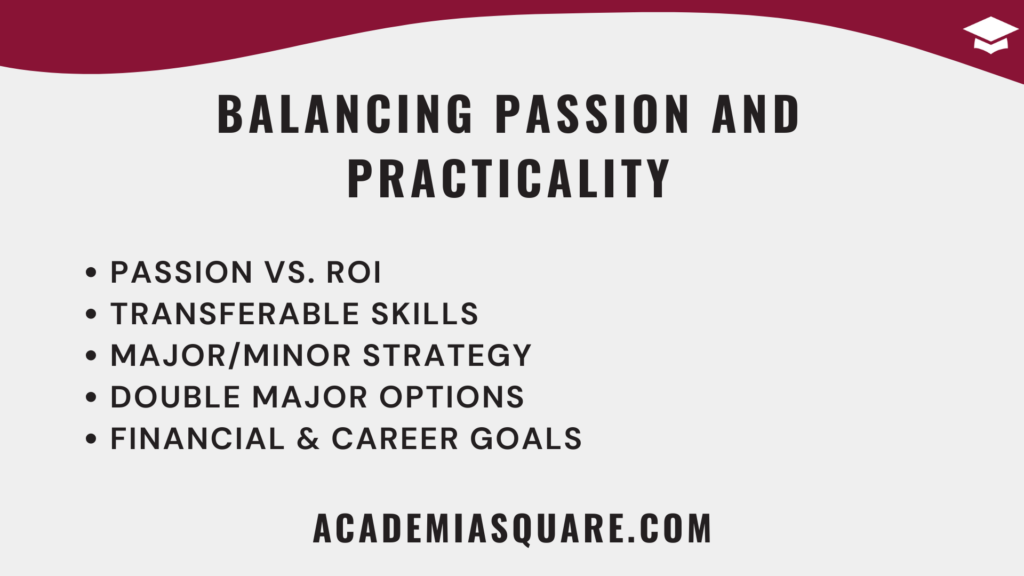
There’s an age-old debate when it comes to choosing a college major: follow your passion, or follow the money? The truth is, the best choice usually lies somewhere in between. A successful major often balances what you love with what the world needs—and is willing to pay for.
Why Passion Alone Isn’t Always Enough
Passion is essential, but it doesn’t guarantee financial stability or job availability. Loving art history or literature is valid, but students should enter these fields with their eyes open. According to labor market data, some majors—while intellectually fulfilling—have limited job growth or lower average salaries.
This doesn’t mean you should avoid them. It means you need to plan thoughtfully. Combine your interests with strategic minors, practical skills, or internships to enhance employability.
How to Choose a College Major with ROI in Mind
Return on Investment (ROI) measures the value you get from a degree compared to the cost. Tools like the Georgetown University Center on Education and the Workforce’s ROI rankings help students compare majors by lifetime earnings.
High-ROI majors often include:
- Engineering
- Computer Science
- Health-related fields (Nursing, Pharmacy)
- Finance and Business
However, even within low-ROI majors, students who build complementary skills—like data analysis, public speaking, or project management—often find rewarding careers.
Strategies for Balancing Passion and Practicality
If you’re torn between a “safe” choice and a “soulful” one, try these combinations:
- Double major: Pair art with marketing, or psychology with data science.
- Major/minor approach: Major in something practical and minor in your passion (or vice versa).
- Focus on transferable skills: Choose a field that builds critical thinking, writing, communication, or problem-solving—skills every industry values.
Choosing a college major doesn’t have to be an either/or decision. With intention and flexibility, you can create an academic path that feeds your interests while preparing you for the job market.
Double Majors and Minors: Expanding Your Academic Horizon
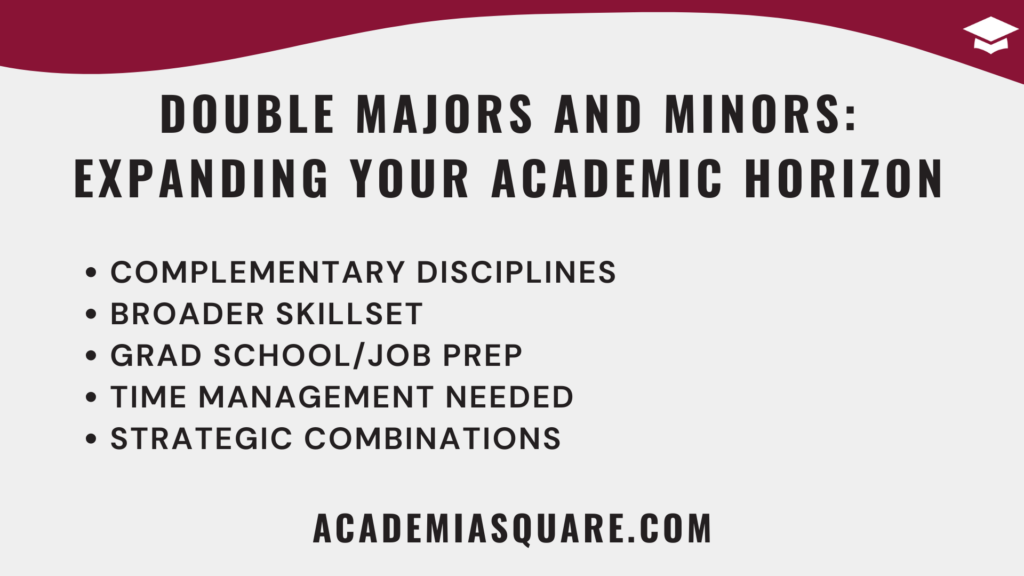
Once you’ve narrowed your interests, you might find that one major isn’t quite enough to cover everything you want to explore. That’s where double majors and minors come in. These options allow you to combine disciplines, add specialization, and keep your academic journey flexible and rich.
Should You Consider a Double Major?
Double majoring means completing the full requirements of two academic programs. It’s challenging—but rewarding. It can make you more versatile in the job market, especially if your fields complement each other.
- Example: Computer Science + Philosophy = Tech + Ethics in AI
- Example: Economics + Political Science = Great prep for law school or public policy
Before committing, speak with advisors to ensure it’s realistic within your graduation timeline. Some majors overlap in course requirements, making it more feasible.
Minors: Depth Without the Workload
Minors are smaller, focused areas of study that require fewer credits than a major. They let you explore another interest without overloading your schedule. A minor can enrich your résumé, show intellectual curiosity, and offer a competitive edge.
Popular combinations include:
- Business major + Graphic Design minor = Entrepreneurial advantage
- Biology major + Environmental Studies minor = Broader STEM perspective
- English major + Data Analytics minor = Creative + analytical blend
How to Choose a College Major with Supporting Fields
Adding a second major or a minor should enhance—not complicate—your academic plan. Ask yourself:
- Does this combination support my career goals?
- Will I be able to manage the workload and stay on track to graduate?
- Does this extra field fill a gap in my current skill set?
In the end, pairing fields of study gives you a broader toolkit. It shows initiative, intellectual breadth, and often makes you stand out—whether you’re applying for grad school, internships, or your first job.
Changing Majors: It’s Okay to Pivot
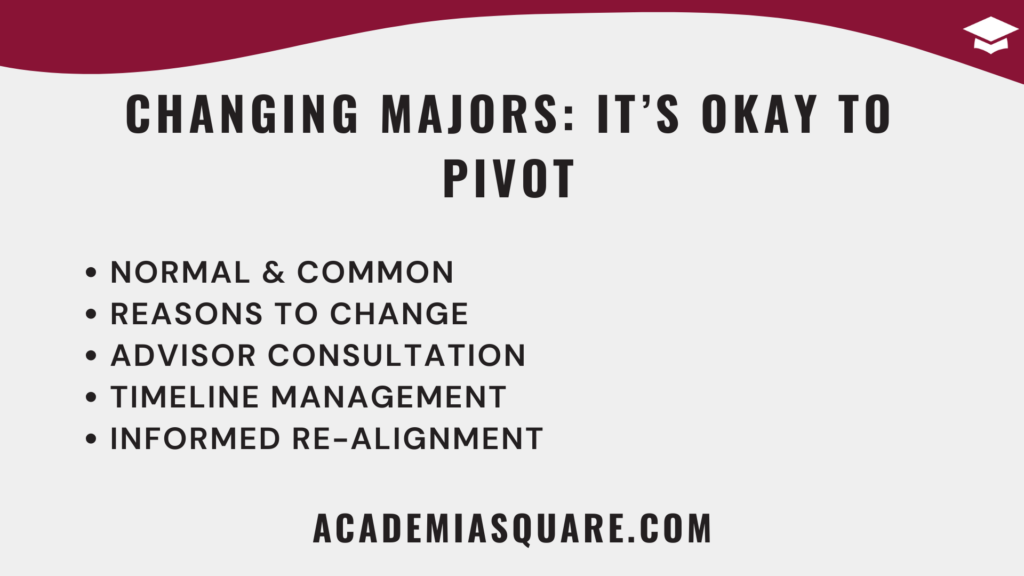
Many students feel anxious or even ashamed when they consider changing their major. But here’s the truth: it’s not just common—it’s often smart. Studies show that nearly a third of students change their major at least once within the first three years of college. In some cases, students change two or more times. Changing direction doesn’t mean failure—it means growth, self-awareness, and adaptability.
Why Students Change Their College Major
There are several valid reasons why a student may realize their initial major isn’t the right fit:
- Discovering a stronger interest in another field through electives or Gen Eds
- Struggling academically in the current major despite effort
- Changing career goals based on internships, mentorship, or research
- Better understanding of what work-life balance or job market realities look like
If you identify with any of these, you’re not alone—and you’re likely making a more informed decision now than you did when you started.
How to Change a Major the Right Way
Changing majors doesn’t have to delay graduation or derail your plans. But it does require thoughtful planning. Here’s how to pivot effectively:
- Meet with your academic advisor to map out a new path and assess transfer credits.
- Compare degree requirements to see how many courses overlap.
- Check whether the new major allows late-entry students or has special requirements.
- Consider the timing—changing in your first two years is usually easier than in your final year.
Some schools even allow students to design interdisciplinary majors if no existing option fits perfectly. Flexibility exists—you just have to ask.
Choosing a College Major After a Change
When you do make a switch, be intentional. Use what you’ve learned from your previous experience to choose a new major that better aligns with your goals and strengths. Ask yourself:
- What didn’t work about my last major?
- What excites me about this new path?
- How does this change support my future?
Changing your major can be one of the most empowering decisions you make in college—one that sets you on a more authentic, fulfilling course.
Resources and Tools for Decision Making
When you’re wondering how to choose a college major, it’s easy to feel alone—but you’re not. There are many tools and support systems designed to help you make an informed decision. From assessments to one-on-one guidance, the right resources can clarify your strengths and show you where they align with academic programs and careers.
Career and Academic Counseling Services
Most schools offer free access to academic and career counselors. These professionals can:
- Help interpret your interests and academic performance
- Introduce you to career paths tied to specific majors
- Assist with course planning and scheduling
- Connect you to alumni or internship opportunities
Book an appointment early—even in your first year. These sessions can prevent wasted time and credit hours down the line.
Online Tools to Help You Choose a Major
Digital platforms provide self-assessments, career exploration, and major-matching tools. These can be especially useful if you’re still undecided:
- MyMajors: Offers quizzes and matches you with potential majors.
- O*NET Interest Profiler: A government-backed tool that connects interests to career fields.
- What Can I Do With This Major?: A popular resource showing career paths tied to specific college majors.
- Naviance: Often used by high schools for college and career readiness planning.
Use these tools not as final answers, but as guides to inform further exploration.
How to Choose a College Major Using Campus Resources
Beyond counselors and websites, your campus offers many informal ways to explore majors:
- Attend major fairs and department open houses
- Talk to professors during office hours about their field
- Join clubs related to fields you’re considering
- Ask upperclassmen about their major decisions and experiences
The more information you gather, the easier it is to feel confident about your direction. These tools aren’t just add-ons—they can be decision-making game changers.
How to Choose a College Major as a High School Student
If you’re still in high school, you might feel pressure to have it all figured out before college. While it’s true that some programs (like nursing or engineering) require early commitment, most colleges allow you to enter as “undecided” and declare a major later. That said, there are smart steps you can take now to make a more informed choice.
Start Exploring Early
You don’t need to know your exact career path at 17, but you should start noticing what excites you. Take different types of classes—STEM, humanities, business, arts. Challenge yourself with electives or AP courses in areas you’re curious about.
Also consider extracurriculars:
- Are you a leader in student council? Maybe political science or business fits.
- Do you volunteer often? Consider social work or education.
- Love your coding club? Explore computer science or software engineering.
Leverage College Planning Resources
High school is a perfect time to explore with low risk. Use your school’s resources to the fullest:
- Meet with your guidance counselor to discuss your strengths and goals.
- Use platforms like Naviance or CollegeBoard’s BigFuture to explore majors and careers.
- Attend local college fairs or take virtual campus tours to see what majors schools offer.
How to Choose a College Major Before College Starts
Choosing early has benefits—it helps when applying to major-specific programs or scholarships. But don’t rush it. Instead, aim to narrow your choices based on the following:
- What subjects do I genuinely enjoy and perform well in?
- What careers have I researched that sound fulfilling?
- Do my current extracurriculars or hobbies point to certain fields?
If you’re unsure, start college with an open mindset and explore strategically. Declaring a major isn’t a race—it’s a reflection of who you’re becoming.
How to Choose a College Major When Undecided
Being undecided about your college major isn’t a flaw—it’s an opportunity. In fact, entering college with an open mind can be an asset, as long as you take a proactive approach to exploration. Many students feel uncertain, especially with so many options and so much riding on the decision. This chapter is designed to help you take control of the situation, rather than letting indecision hold you back.
Why It’s Okay to Be Undecided
About 20–50% of college students begin without a declared major, and even more change their major at least once. Being undecided gives you the freedom to explore diverse fields without being locked into one path prematurely. It can lead to a more informed and satisfying decision down the road.
However, it’s important not to remain passive. The key is to turn your “undecided” status into an active period of discovery.
Steps to Take When You’re Undecided
If you’re not sure how to choose a college major yet, these steps will help you make progress without pressure:
- Take a broad mix of courses: Enroll in a variety of Gen Eds and electives in your first year to experience different subjects firsthand.
- Track your reactions: Keep a journal or digital notes about which classes excite you and which ones don’t.
- Meet regularly with your advisor: They can help you structure your course load to keep multiple options open.
- Use interest and personality assessments: Tools like MBTI, Holland Code (RIASEC), and StrengthsFinder can highlight areas where your personality and skills align with certain majors.
Choosing a College Major Through Exploration
Some of the best discoveries come through experimentation. If you’re undecided, this is your time to try:
- Clubs and extracurriculars: Join organizations tied to potential fields (e.g., debate for pre-law, coding club for computer science).
- Volunteer work: Gain experience in various settings to see what excites you.
- Shadowing professionals: Spend a day or two with someone working in a field you’re considering.
These real-world experiences can provide more clarity than any quiz or course description.
Being undecided doesn’t mean being unprepared. With intention and curiosity, you’ll gather the insights needed to choose a major that fits both who you are now and who you want to become.
Conclusion: Making an Informed and Confident Decision
After navigating through interests, strengths, career goals, course experiences, and practical tools, you’re in a much stronger position to choose your college major with confidence. This isn’t just an academic label—it’s the beginning of your personal and professional journey. And while it’s important, it’s also flexible. Your major should support your growth, not restrict it.
What You’ve Learned About How to Choose a College Major
By now, you’ve uncovered the key elements that should guide your decision:
- Your passions and strengths discovered through self-assessment
- Career goals aligned with real-world market demand
- Academic exploration through Gen Eds, electives, and extracurriculars
- Available resources and advising systems to support your journey
- The flexibility to pivot and adjust as your interests evolve
Giving Yourself Permission to Grow
One of the most empowering parts of college is that it allows you to change. You may begin in one direction and discover an entirely new passion. That’s not a misstep—it’s progress. As long as you keep asking the right questions, seeking out feedback, and taking action, you’re on the right path.
Remember, choosing a college major is not about locking in your future—it’s about opening doors to possibilities. It’s a foundation, not a ceiling.
With clarity, intention, and a bit of courage, you’ll not only choose the right major—you’ll shape a meaningful academic journey that serves your goals now and in the future!
Sources and Recommended Reading
- Roberts, M.C., & Zweig, R.A. (2020). “Choosing a Major.” In The Psychology Major’s Handbook. SAGE Publications.
- Goyette, K.A., & Mullen, A.L. (2020). “Postsecondary Students and the Process of Selecting a Major Field.” Sociology of Education.
- Buser, T., Niederle, M., & Oosterbeek, H. (2015). “Satisfaction With College Major: A Grounded Theory Study.” ERIC.
- Wright, C. (2018). “Choose Wisely: A Study of College Major Choice and Major Switching.” ERIC.
- OpenStax. (2019). “Planning Your Degree Path.” College Success.
- OpenStax. (2019). “Why Worry about a Career While I’m in College?” College Success.
- Goyette, K.A., & Mullen, A.L. (2019). “Gender and Logics of Major Choice.” Sociology of Education.
- Beggs, J.M., Bantham, J.H., & Taylor, S. (2010). “Choosing a College Major: Factors that Might Influence the Way Students Make Decisions.” ERIC.
- Academia Square. “How to Choose a University: An Independent Guide”
- Academia Square. “How to Write a Lab Report: Full Guide with Examples (2025).”


